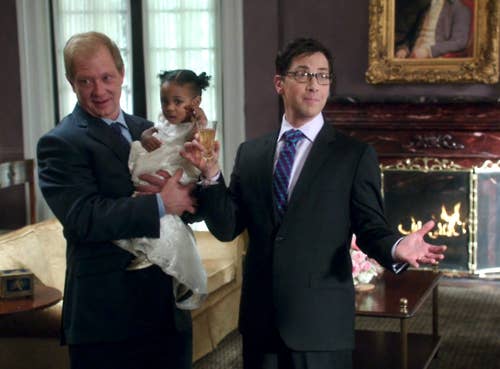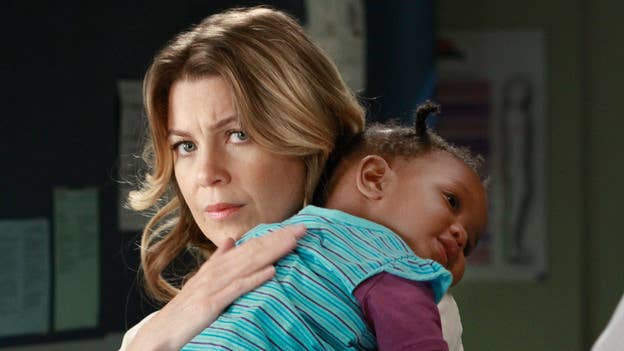
When ABC's Scandal returned from a brief winter hiatus last month, White House Chief of Staff Cyrus Rutherford Beene and his husband James Novak christened their new baby daughter Ella. Despite the drama between James and Cyrus, Rhimes dealt with the adoption itself the same way she deals with race on her shows — not with didactic speeches, but by weaving it seamlessly into her characters' lives.
The story line has become the latest example of a consistent theme across Rhimes' three television shows: Adoption (and in particular, adoption of a black child) is normal and good.
Although Rhimes has not publicly stated that the story lines surrounding the adoption of black children was inspired by her own experiences, she did adopt her first daughter in 2002, partially inspired by the Sept. 11 terrorist attacks. In an interview with Oprah Winfrey, Rhimes said, "I thought, Well, if the world's going to end, what are all the things I've ever wanted to do? I went home and hired an adoption attorney." In early 2012, Rhimes adopted her second daughter.
The adoptions on Rhimes' shows don't mirror her own personal experiences (at least from what she's said to the press), but the presence of such plots has helped further normalize adoption in the public eye. Her characters have been vocal about their desire to raise these children. Like Rhimes, they've seen parenthood as the thing they've always "wanted to do."
Rhimes' representations of adoption are as diverse as her casts. On Grey's Anatomy, lead character Meredith Grey went through the adoption process after miscarrying and while her marriage began to crumble. Hiding this became a major plot point, as she feared her lack of a stable home environment and potential firing could prevent her adoption of baby Zola, an orphan from Malawi. Cyrus and James on Scandal often used Ella's adoption as a bargaining chip in their relationship, but this small story arc paled in comparison to the show's larger political narrative.

Private Practice follows former Grey's character Addison Montgomery's struggles to find a partner, conceive a child, and ultimately go through the adoption process as a single woman. From the beginning of the show, audiences were aware of Addison Montgomery's desire to be a mother. In later seasons, her romantic struggles were often tied to her desire to be a parent. The longer she took to "fall in love," the longer it would take her have a child. Eventually she gave up this pursuit, finding the prospect of finally becoming the sort of parent that she always wanted to be taking precedence over her romantic interests. Addison pursued fertility treatments on her own, and when those were unsuccessful, she adopted a baby boy named Henry. This was a critical turning point for the character and for our understanding of her. And in all these cases, the adoption narrative isn't a separate political point Rhimes is making; it's an integral part of her characters' life stories.
All of the adopters on Rhimes' shows are white, and all of their adopted babies are black. To an extent, this reflects reality. According to the U.S. Department of Health and Human Services, 73% of all adoptive parents are white. And black children are overrepresented in the adopted population: 23% of adopted children are non-Hispanic black, though just 14% of all children in the United States fit that racial designation.
But Rhimes doesn't make the race of adoptive parents or their children a major issue. This is in line with her treatment of race in general — when she addresses it at all, she does so subtly. Rather than utilize one of her long and signature character monologues to discuss major race issues, Rhimes and her writers usually highlight micro-aggressions. Rhimes' shows are diverse without moralizing or spending too much time on race, so it's no surprise that she doesn't make race the central point of her adoption stories.
What is apparent instead is Rhimes' enthusiasm for the adoption of these children. Her characters never see it as weird or strange. The desire to be a parent overrules any potential cross-cultural strife. How this will play out as the children age is still up for debate. But for now, Rhimes' shows have made adoption a normal part of characters' lives. Much as she deals with race, Rhimes has approached adoption with a light touch. For her, racial conflict and the difficulties (and joys) of adopting a child are not issues to be considered in isolation, but daily parts of her characters' experience. Rather than taking a hard and vocal stance, she has integrated the adoption process into the greater reality of her televised worlds.

